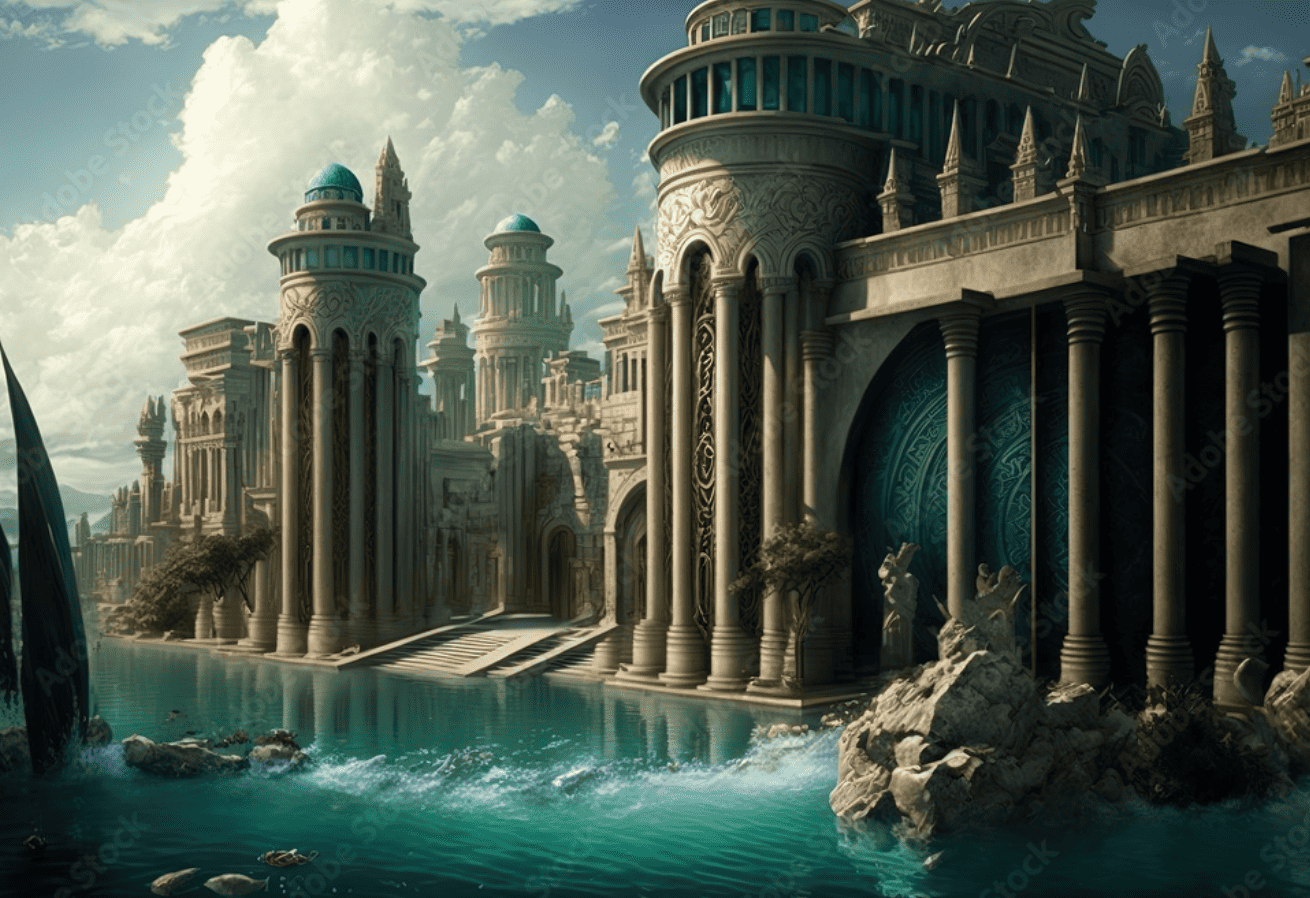Where Is The Lost City Of Atlantis? New Discoveries & Theories!
*Includes 2023 & 2024 recent discoveries! *
The story of Atlantis sinking is a mythical tale originating from the writings of the ancient Greek philosopher Plato. According to Plato’s dialogues “Timaeus” and “Critias,” Atlantis was an advanced and prosperous civilization. Atlantis existed around 9,000 years before his time, making it roughly 11,000 years ago.
Plato described Atlantis as a large island beyond the “Pillars of Hercules”, which is believed to refer to the Strait of Gibraltar. Atlantis was said to be a powerful and technologically advanced civilization. It was ruled by a succession of kings who had control over vast territories.
Table of Contents
A Brief History of The Lost City of Atlantis
The famous tale of the lost city of Atlantis and its whereabouts. Greek philosopher Plato stated that Atlantis was an advanced civilization that pre-dated man as we know it. With technology that far surpasses anything that exists today. An otherwordly civilisation.
Renowned philosopher Plato states he heard the story of Atlantis from his grandfather. Who heard it from the Athenian statesman Solon (300 years before Plato’s time). Who learned it from an Egyptian priest, who said it had happened 9,000 years before that…
There are many theories of its whereabouts, from Spain to the Bermuda Triangle, which we will discuss and uncover below!
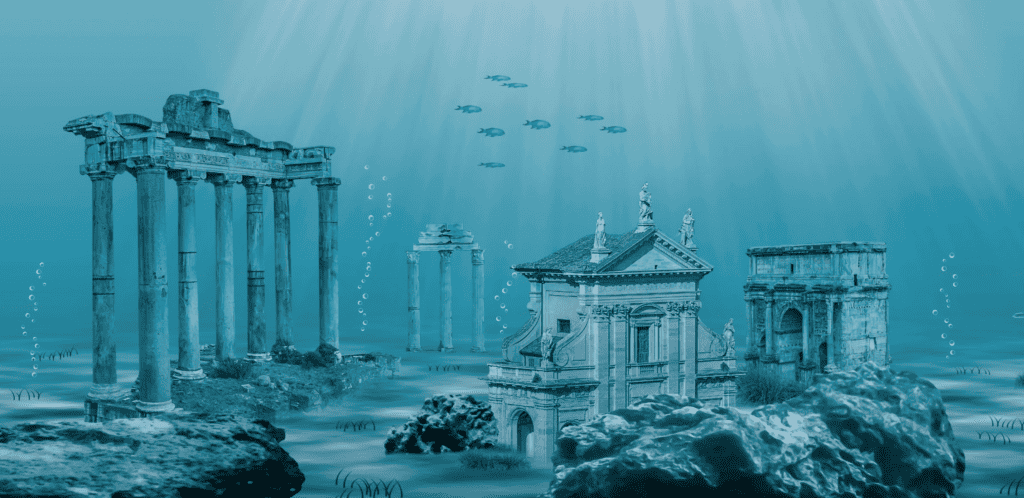
Where Is The Lost City Of Atlantis Now?
Atlantis, if a genuine place, was destroyed by a cataclysmic wave. Said to be so catastrophic, that it washed away its entire civilisation. Architectural structures, temples, homes and people, wiped out in hours. Leaving all of its mysteries and secrets to merge with the ocean floor.
Some theories suggest this ‘cataclysmic wave’ could of been the great flood we hear about in the bible. Many different religions and ancient texts refer to an apocalyptic type of flood of some description.
Possible Locations for The Lost City Of Atlantis:
*Please note these are just theories based on my research. None of them are conclusive… (yet).
The Mid-Atlantic Ridge (New 2023 Theory)
AtlanitC…AtlantiS ?
“Baffled scientists discover ‘perfectly aligned’ holes punched into the ground 1.7 miles below the surface of the Atlantic Ocean that look like human-made excavations.”
Daily Mail
In 2022, explorers found mysterious holes on the seafloor nearly 2 miles below the Atlantic Ocean’s surface. The area where these unexplained excavations have been found is a site of frequent earthquakes.
This matches well with the description of Atlantis. It could also explain why it sank underwater. So with further uncovering, this could very well be a location for Atlantis.
Scientists state that the holes have been previously spotted; however, their origin remains a mystery.

Underwater Egyptian Coast (New 2024 Theory)
Recently, at the start of this year (2024), A team of marine archaeologists exploring the depths of the coast of Egypt stumbled upon something truly extraordinary—a hidden underwater city!
Originally, Kathleen Martinez spent many years searching for Cleopatra’s tomb. And for many years, she has had her suspicions that it could now be underwater due to the changing terrain over thousands of years. The government of Egypt finally gave her permission last year to start searching for underwater temples.
But here’s where it gets exciting. Not only did they find a temple… but the ruins of a long-lost city. And for all Atlantis connaisseurs… suspicions have already begun to surface! Could this mysterious city be the long-lost Atlantis?
This newly discovered underwater city, just off the coast of Egypt, shares some striking similarities with the descriptions of Atlantis from ancient texts. From the city’s layout to the advanced engineering techniques used in its construction, plenty of clues have got experts scratching their heads.
Could this be the Atlantis that Plato wrote about? Could this discovery rewrite history as we know it?
Of course, we’re not jumping to any conclusions just yet. But it’s hard not to get excited about the possibilities. After all, isn’t the thrill of discovery what makes archaeology so fascinating?
Gibraltar, Spanish Coast. (Pillars of Hercules)
Recently, Spanish archaeologists uncovered 2,500-year-old statues that may resemble the faces of an ancient society that mysteriously disappeared. (Que Atlantis theories!)
The link between Tartessos and the Pillars of Hercules (often associated with Atlantis) is a subject of speculation and interpretation. However, it lacks conclusive evidence.
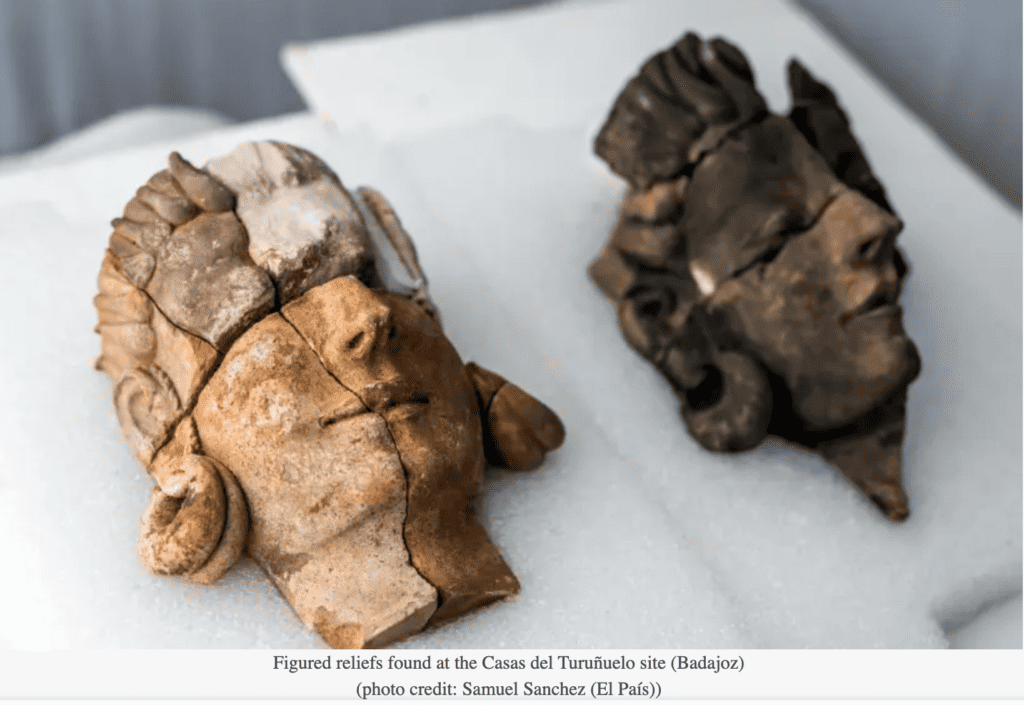
Here’s a brief overview of the connection that has been proposed:
- Tartessos and the Pillars of Hercules: Tartessos was an ancient civilization that thrived in the southern Iberian Peninsula, specifically in present-day Spain and Portugal, during the first millennium BC. The Gates of Hercules refers to the Strait of Gibraltar, which separates the Atlantic Ocean from the Mediterranean Sea. The Pillars of Hercules are two prominent headlands that flank the strait. They are known today as the Rock of Gibraltar and Jebel Musa in Morocco.
- Plato’s Atlantis: In Plato’s dialogues “Timaeus” and “Critias,” he mentions Atlantis being located beyond the Pillars of Hercules. Some theorists propose that the ancient civilization of Tartessos could have been the basis for Plato’s Atlantis. They suggest that Tartessos, with its advanced and prosperous culture, trading networks, and proximity to the Strait of Gibraltar, could have influenced Plato’s narrative.
- Historical Interpretations: Some researchers believe that the Tartessos civilization had significant maritime connections. It might have controlled trade routes through the Strait of Gibraltar. These theories suggest that Tartessos, due to its strategic position near the Pillars of Hercules, could have been a potential inspiration for Plato’s Atlantis.
Agadir, Morocco
Plato famously wrote that Atlantis was opposite “The Gates of Hercules.” Some believe these gates could have been the straits of Gibraltar, two peninsulas of southern Spain and Morroco.
In Plato’s era, there was only one route out of the Mediterranean Sea. This makes it a likely destination to house one of the most Magnificent civilizations ever built.
Also, the name “Agadir”, the town in Morrocoy where the presumed gates are, shares a Phoenician root with “Gades”. This makes it the likeliest candidate for the gates of Hercules.
Agadir’s position near an undersea fault line leaves it vulnerable to earthquakes and floods. This could easily have destroyed a city like Atlantis in one fair swoop. Such a disaster levelled Agadir in 1960, wiping out most of its city.

Santorini, Greece
This Aegean island is known for its outstanding natural beauty. However, it could house one of the world’s greatest mysteries under the picturesque turquoise water. Is Santorini the key to where the lost city of Atlantis is?
Santorini is a ring-shaped lagoon formed over multiple years of environmental destruction. It has active volcanoes and is a prominent geographical hotspot for earthquakes. This makes it a prime area for a vast, mighty civilization to disappear and sink underwater without a trace.

In 1967, the ancient port city of Akrotiri was discovered. It had been buried under several meters of ash for over 3,600 years. When revealed, it had frescoes that mysteriously echoed details of the stories of Atlantis.
It also features red, white, and black sand beaches that correspond to Plato’s stories. How Plato described Atlantis leaves Santorini a highly suspected possible location for Atlantis.

Malta
Plato’s writings on Atlantis claimed it to be an island civilization sprawled with magnificent sacred temples and monuments. Malta is known for being a highly mysterious island. It is also home to the oldest free-standing stone structures in the Mediterranean.
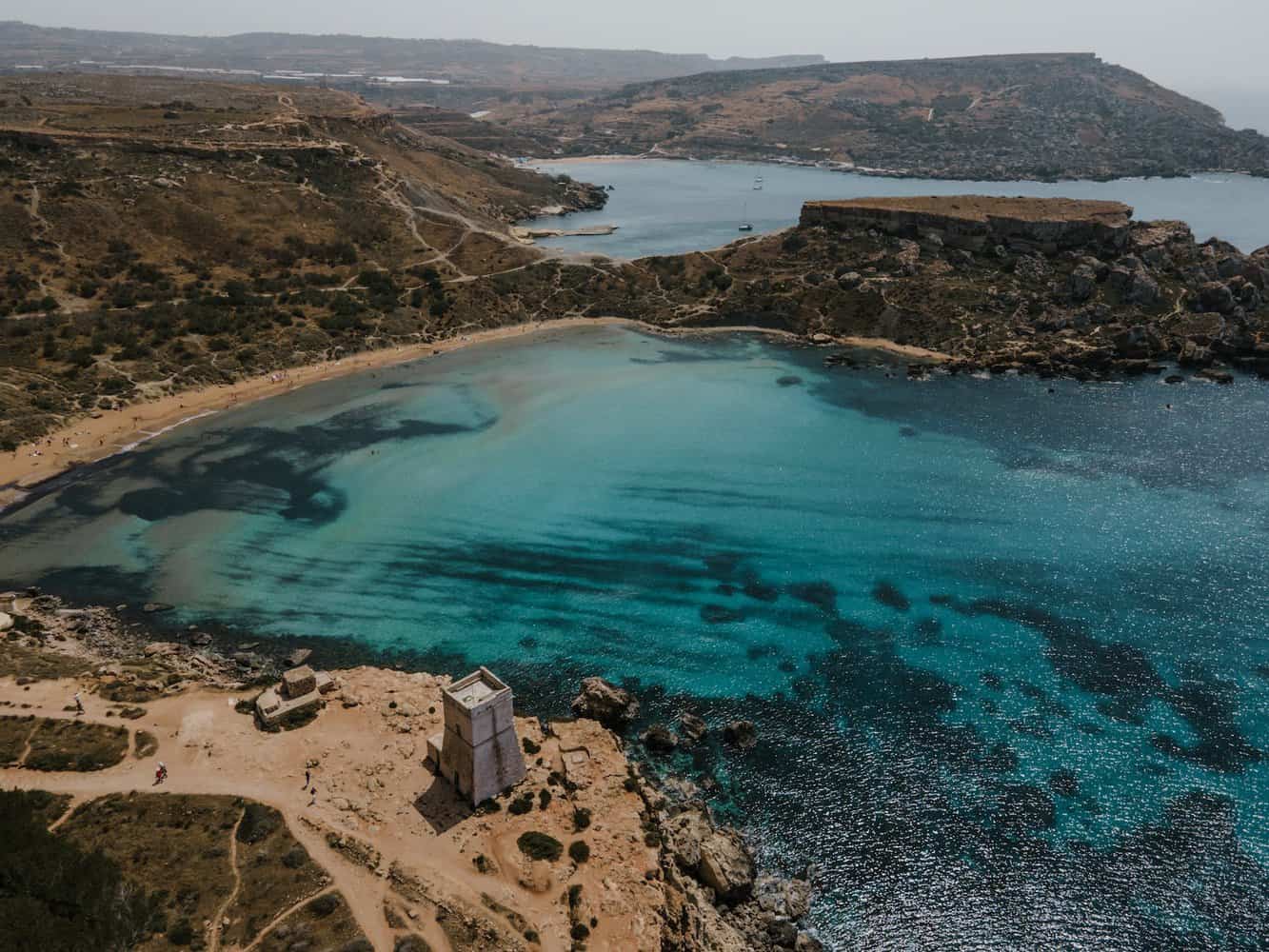
‘Hagar Qim’ and ‘Mnajdra’ are famous Maltese temples. They were erected several centuries before the first stone was placed at the Great Pyramid of Giza. This is an incredible feat of engineering for that era. It creates a sense of wonder about how and why the ancient Maltese were so advanced in their technology.
Plato often said that Atlantis was home to advanced technology beyond its time. Some theories even suggest that Atlantis could have been an ancient alien civilization. (If you subscribe to that kind of thing.)
Like in the tragic story of Atlantis, Malta’s population also had been subject to the fate of a watery apocalyptic sinking.
Antarctica / Polar Ice caps
Who knows what lies beneath Antarctica’s seas or hidden, frozen in time, beneath the polar ice caps? Some theorists say that Atlantis could have been a civilization that pre-dated man as we know it.
It could have been destroyed by an apocalyptic wave caused by a meteorite. Then frozen, motionless and captivated by vast stretches of glaziers we know today as Antarctica or the polar caps.
The only way to prove or disprove this idea would be for Antarctica’s ice cap to melt. Unfortunately, a devastating event as such is not unlikely due to the acceleration of climate change. However, hopefully, this secret will remain wrapped up in earth-saving ice, where it’s meant to be.
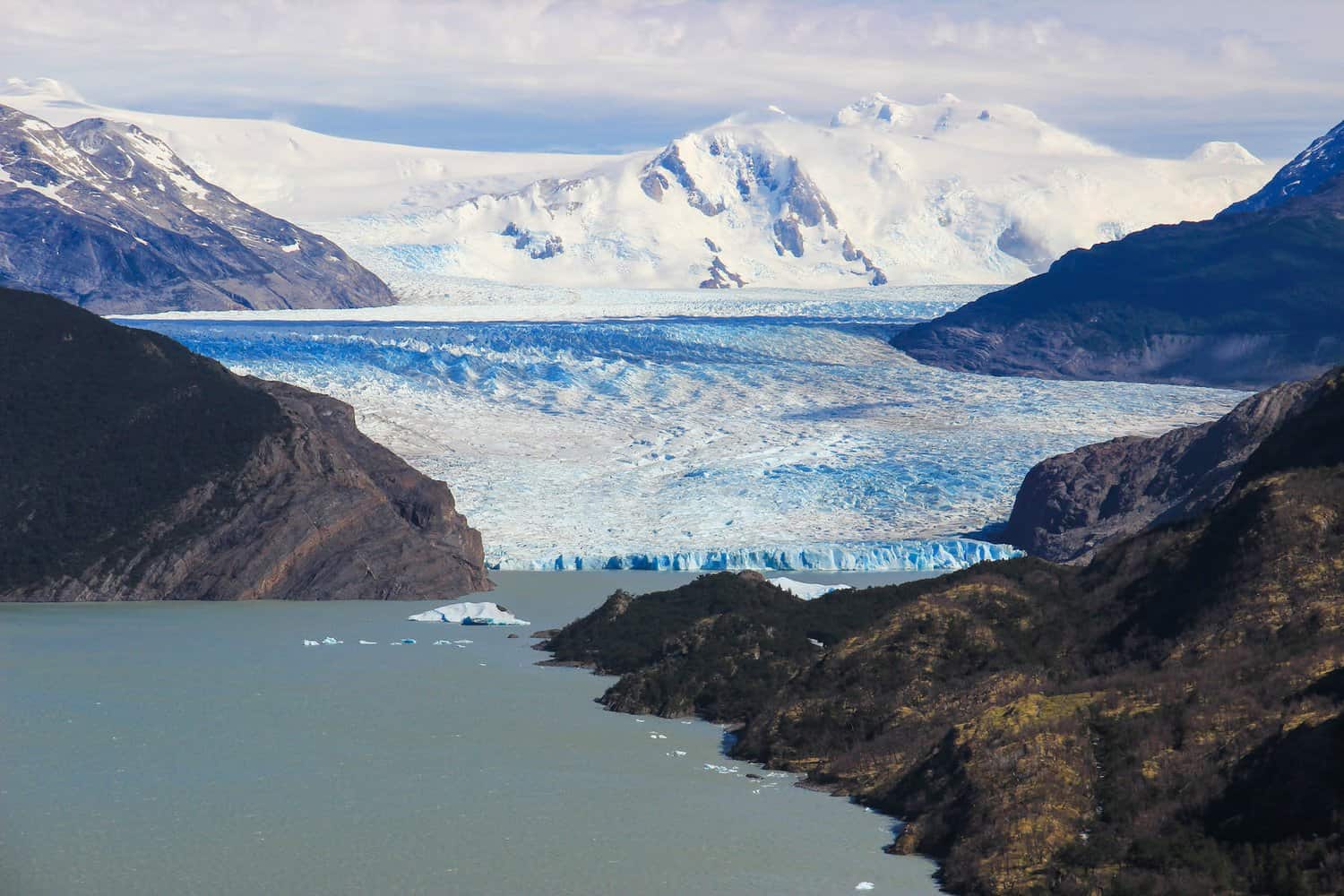
On a brighter note, we are developing new technology daily that can bring us closer to finding concrete evidence of this mystical city. Even through miles-deep of ice glaciers, without them having to melt. Great human efforts are also being put towards the climate disaster. However, much more needs to be done.
FAQ’s – “Where is the lost city of Atlantis?”
What was the Lost City of Atlantis like?
According to the accounts provided by Plato, Atlantis was described as an advanced and prosperous civilization with distinctive characteristics. Plato’s descriptions of Atlantis are primarily found in his dialogues “Timaeus” and “Critias.” Here are some key aspects often associated with Atlantis based on Plato’s writings:
- Powerful and Technologically Advanced: Atlantis was depicted as a highly developed civilization with advanced technology and infrastructure. Plato described impressive engineering feats, including a network of canals and irrigation systems that served the city.
- Size and Layout: Atlantis was said to be a large island that encompassed concentric rings of land and water. The city itself was positioned at the island’s centre, surrounded by alternating rings of water and land. The layout was organized and designed with precision.
- Rich and Prosperous: Atlantis was depicted as a wealthy and prosperous society. Plato mentioned vast reserves of resources, including precious metals such as gold, silver, and orichalcum (a legendary metal).
- Governance and Society: Atlantis was ruled by a series of kings who inherited power. The society was described as highly structured and hierarchical, focusing on maintaining harmony and balance. Education, arts, and culture were also emphasized.
- Military Power: Atlantis was portrayed as a dominant military force with a well-organized army and a powerful navy. The Atlanteans were known for their advanced weaponry and strategic capabilities.
- Morally Corrupt: Despite its initial prosperity, Atlantis was depicted as becoming morally corrupt and decadent. Plato attributed its downfall to arrogance, greed, and aggression, leading to conflicts with neighbouring lands.
It’s important to note that these descriptions come from Plato’s writings and are not based on historical or archaeological evidence. The details and interpretations of Atlantis can vary among different sources and theories.
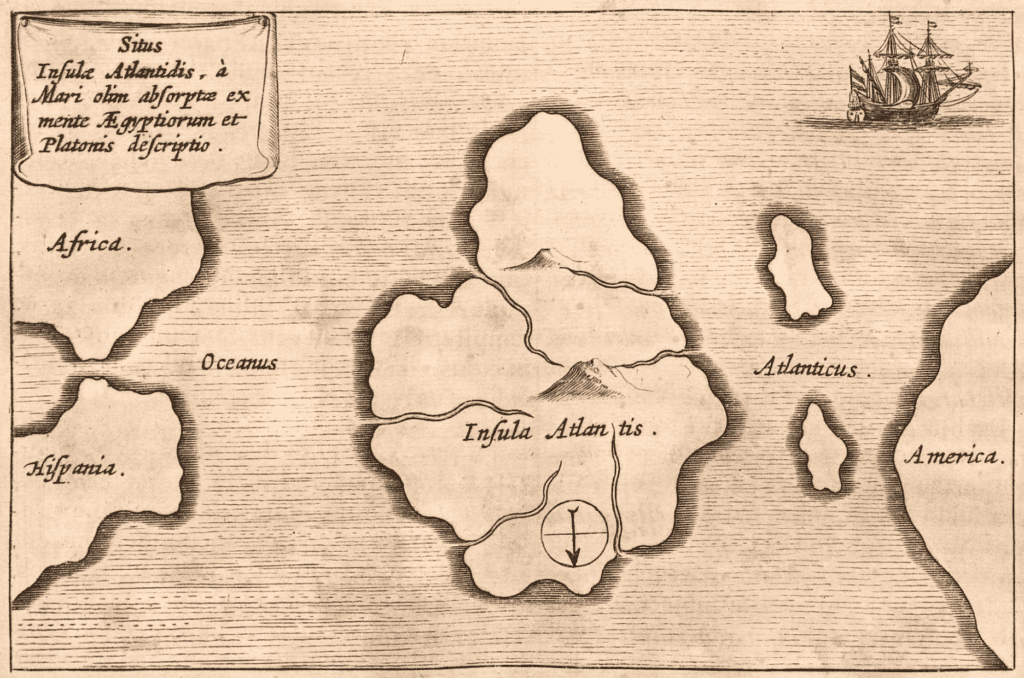
How Did The Lost City Of Atlantis Sink?
According to Plato, Atlantis became morally corrupt and greedy, and its expansionist ambitions led to conflicts with neighbouring lands. Eventually, the gods punished Atlantis for its hubris and decadence. Then, in a catastrophic event, the island of Atlantis was said to have been swallowed by the sea. Disappearing beneath the waves, sinking into the ocean’s depths.
It’s important to note that the story of Atlantis is considered a legend or myth. There is no concrete evidence to support its existence or sinking. Many theories and speculations have emerged over the centuries. Including natural disasters like earthquakes or tsunamis, but these are purely speculative.
The legend of Atlantis has captured the imagination of many people, and various interpretations and theories continue to circulate. Still, its actual existence and the sinking circumstances remain unsurpassed in mystery.
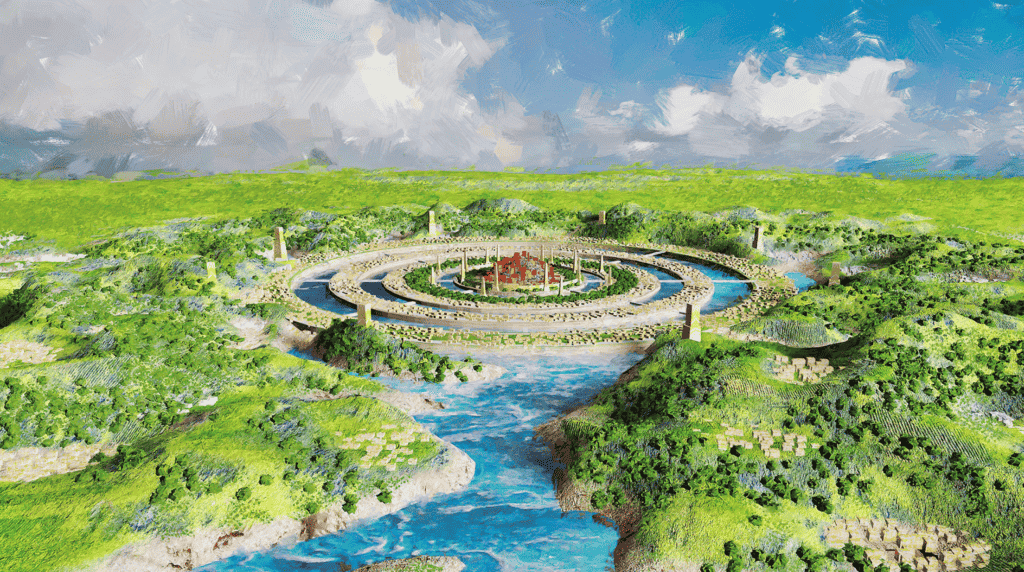
Is Atlantis a Real Place?
The existence of Atlantis as a real place remains unverified. Concrete evidence needs to support its existence. The ancient Greek philosopher Plato originally described the story of Atlantis in his dialogues “Timaeus” and “Critias.”
However, it is widely believed that Plato used Atlantis as a fictional allegory to convey philosophical and moral lessons rather than describing an actual historical location.
Despite extensive speculation and numerous theories, archaeological discoveries or credible historical records have yet to be found that definitively prove the existence of Atlantis.
Many hypotheses suggest possible locations for Atlantis. Including areas in the Mediterranean, the Caribbean, or even Antarctica. However these proposals are largely speculative and need more substantial evidence.
While Atlantis continues to capture people’s imagination and inspire exploration and research. It remains a legendary and mythical place rather than a confirmed historical location.
Has Anyone Ever Found Atlantis?
No, to date, no concrete evidence or definitive discovery of Atlantis has been made. Despite numerous theories, expeditions, and searches conducted over the years, archaeological remains or conclusive proof of the existence of Atlantis have yet to be found.
Various individuals and groups have claimed to have discovered Atlantis or to possess evidence of its location, but the scientific community has yet to accept these assertions widely. These claims often lack solid empirical evidence and rely on speculative interpretations of historical texts or ambiguous geological formations.
It’s important to approach such claims with critical thinking and consider the need for more consensus among experts in archaeology, geology, and history regarding the existence and location of Atlantis. Until substantial and verifiable evidence is presented, Atlantis remains a legendary and elusive place.
What Country Did the Lost City of Atlantis Come From?
According to the accounts provided by Plato in his dialogues “Timaeus” and “Critias,” Atlantis was said to have been located beyond the “Pillars of Hercules,” which is commonly associated with the Strait of Gibraltar. However, Plato did not specifically mention the country or region from which Atlantis originated.
Plato described Atlantis as a powerful and advanced civilization but did not attribute it to any particular nation or existing country of his time. Instead, he presented Atlantis as a hypothetical island nation that existed in the distant past, approximately 11,000 years before his time.
Over the centuries, various theories and speculations have emerged regarding the possible location of Atlantis, proposing areas such as the Mediterranean, the Caribbean, or even Antarctica.
However, as mentioned earlier, there is no consensus or definitive evidence to support any specific country or region as the origin of Atlantis. Atlantis’s true nature and location, if it indeed existed, remain uncertain and subject to ongoing debate and speculation.
Who is Searching for the Lost City of Atlantis?
The search for the lost city of Atlantis has captivated the imagination of many explorers, researchers, and enthusiasts over the years. As a result, various individuals and organizations have conducted expeditions and investigations to uncover evidence of Atlantis.
Some notable individuals and groups who have been associated with the search for Atlantis include:
- Ignatius L. Donnelly: In the late 19th century, Ignatius Donnelly, an American politician and writer, published a book called “Atlantis: The Antediluvian World,” in which he presented theories and evidence supporting the existence of Atlantis. His work sparked significant interest and renewed exploration efforts.
- Edgar Cayce: Edgar Cayce, an American psychic and mystic, claimed to have accessed information about Atlantis through his psychic readings. He provided detailed descriptions of Atlantis and its history. His lessons inspire further investigation and speculation.
- J. Manson Valentine: In the 1960s, J. Manson Valentine, a diver and researcher, explored the region around the Bahamas, specifically the Bimini Road, a series of underwater limestone formations. He suggested that the Bimini Road might be connected to Atlantis.
- National Geographic Society: The National Geographic Society has supported various expeditions and research projects related to underwater archaeology and exploration, including investigations in areas proposed as possible locations of Atlantis.
- Independent Researchers and Enthusiasts: Numerous independent researchers, authors, and enthusiasts have dedicated their time and efforts to studying and searching for Atlantis. They explore historical texts, conduct underwater surveys, analyze geological formations, and propose new theories regarding the possible location of Atlantis.
Are There Any Photos of Atlantis?
Atlantis. Since Atlantis is a subject of imagination and speculation, any images or illustrations you may come across claiming to depict Atlantis are artistic interpretations or creations based on various theories and descriptions.
Artists and illustrators have imagined Atlantis differently, often drawing inspiration from Plato’s descriptions or interpretations. These artistic depictions can be found in books, magazines, online articles, and other media. However, it’s important to remember that these illustrations are purely imaginative and not based on concrete evidence.
If you search for “Atlantis illustrations” or “artist renditions of Atlantis,” you may find various artistic representations that can give you an idea of how different artists have envisioned Atlantis throughout history.
So, is the Lost City of Atlantis Real?
The lost city of Atlantis is widely regarded as a legendary and mythical place rather than an actual historical location. The story of Atlantis originated from the writings of the ancient Greek philosopher Plato in his dialogues “Timaeus” and “Critias.”
While Plato’s account described Atlantis in detail, it is generally believed that he used it as a fictional allegory. He may of done this to convey philosophical and moral lessons rather than describing an actual civilization.
No concrete evidence has been found to substantiate the existence of Atlantis. Despite numerous theories and speculations, no archaeological remains or credible historical records have been discovered that definitively prove the reality of Atlantis as a physical city or civilization.
It’s essential to approach the story of Atlantis with a critical mindset and consider it a fascinating legend rather than an established historical fact. While Atlantis continues to capture the imagination of many people, its existence remains unverified, and the search for Atlantis remains a subject of curiosity and debate among historians, archaeologists, and enthusiasts.

